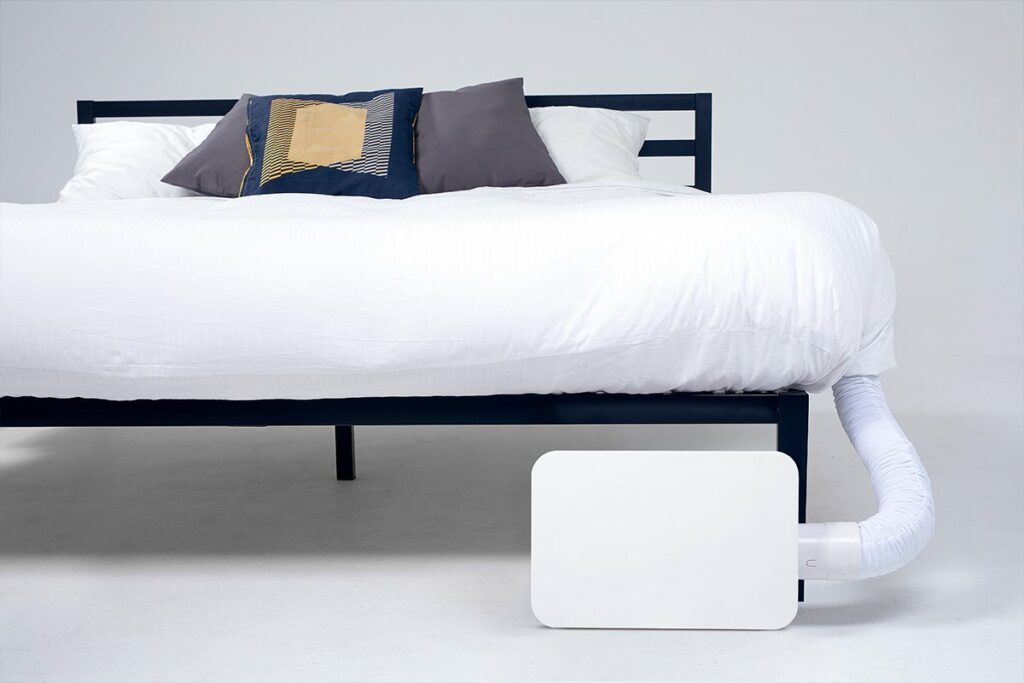
Tired of tossing and turning all night? Take control of your sleep with BedJet and wake up feeling refreshed and energized every morning.
Are you struggling with sleep issues? Poor sleep habits can lead to several health problems, including mental health disorders, cognitive impairment, and chronic diseases. However, implementing evidence-based practices can significantly improve sleep quality and duration. In this article, we will explore tips and examples of how to improve sleep health, including establishing a sleep routine, creating a sleep-conducive environment, managing stress, avoiding stimulants, exercising, and cognitive-behavioral therapy for insomnia (CBT-I).
The Importance of Sleep Health
Sleep is essential for maintaining physical health, cognitive function, and emotional well-being. Chronic sleep deprivation can cause cardiovascular disease, type 2 diabetes, obesity, depression, and anxiety. Thus, prioritizing sleep health should be a necessary aspect of our daily routine.
Evidence-Based Tips for Improving Your Sleep Health
- Sleep health is essential for overall health and well-being and has an impact on chronic diseases, cognitive impairment, and mental health disorders.
- Establishing a sleep routine, creating a sleep-conducive environment, managing stress, avoiding stimulants, exercise, and cognitive-behavioral therapy are evidence-based practices for improving sleep health.
- There are practical tips for implementing evidence-based practices, including patience and persistence in changing sleep habits.
Understanding Sleep
Sleep has two categories: non-REM sleep and REM sleep. Non-REM sleep is divided into three stages, with each stage becoming progressively deeper. REM sleep is the stage associated with dreaming and characterized by rapid eye movement. The circadian rhythm regulates the sleep-wake cycle and is influenced by light exposure, physical activity, and food intake. Disruptions to the circadian rhythm, such as shift work or jet lag, can lead to sleep disturbances. Common sleep disorders include insomnia, sleep apnea, and restless leg syndrome.
Evidence-Based Practices for Improving Sleep Health
Establishing a Sleep Routine
Establishing a regular sleep routine is an essential component of improving sleep health. Going to bed and waking up at the same time each day can help regulate the body's internal clock and improve sleep quality. Relaxation techniques, such as reading or taking a bath, can help calm the mind and prepare the body for sleep. For example, a study showed that implementing a consistent sleep routine significantly decreased insomnia symptoms in older adults.
Creating a Sleep-Conducive Environment
Creating a sleep-conducive environment is another important factor in improving sleep health. The bedroom should be cool, quiet, and dark to promote optimal sleep conditions. Comfortable bedding and pillows can also help improve sleep quality. Technology can be a significant disruptor of sleep. It is essential to limit the use of electronic devices in the bedroom, as the blue light emitted by these devices can interfere with the body's natural sleep-wake cycle. Research has shown that optimizing the sleep environment can lead to improved sleep quality and duration. For example, a study showed that reducing nighttime noise exposure improved sleep quality in ICU patients.
Managing Stress
Stress can significantly impact sleep quality. Techniques for managing stress, such as meditation and deep breathing exercises, can help calm the mind and reduce anxiety. For individuals with underlying mental health disorders, such as depression and anxiety, it is essential to address these issues to improve sleep quality. Cognitive therapy can be an effective treatment for addressing the psychological causes of sleep disorders. Several studies have shown that stress management techniques can improve sleep quality and reduce sleep disturbances. For example, a study showed that mindfulness-based stress reduction significantly improved sleep quality in women with breast cancer.
Avoiding Stimulants
Stimulants, such as caffeine, alcohol, and nicotine, can significantly impact sleep quality. It is important to avoid or limit these substances, particularly before bed. Caffeine is a stimulant that can take several hours to wear off. It is best to avoid caffeine consumption in the afternoon and evening. Alcohol can also disrupt sleep, particularly in the second half of the night. While it may initially induce drowsiness, it can lead to fragmented sleep and early morning awakenings. Research has shown that avoiding stimulants can improve sleep quality and reduce sleep disturbances. For example, a study showed that reducing caffeine consumption significantly improved sleep quality in college students.
Exercise and Physical Activity
Regular exercise and physical activity can promote better sleep health. Exercise has been shown to reduce stress and anxiety, which can significantly impact sleep quality. It is important to note that the timing of exercise can impact sleep quality. Vigorous exercise close to bedtime can disrupt sleep, while moderate exercise earlier in the day can promote better sleep quality. Several studies have shown that regular exercise can improve sleep quality and duration. For example, a study showed that regular exercise significantly improved sleep quality in older adults with insomnia.
Cognitive Behavioral Therapy for Insomnia (CBT-I)
Cognitive-behavioral therapy for insomnia (CBT-I) is a specific type of therapy that focuses on changing negative thought patterns and behaviors surrounding sleep. CBT-I has been shown to be an effective treatment for insomnia, with long-lasting benefits. Unlike medication, CBT-I addresses the underlying causes of insomnia, rather than just treating the symptoms. It can also be particularly beneficial for individuals who have struggled with insomnia for an extended period. Research has shown that CBT-I can significantly improve sleep quality and reduce symptoms of insomnia. For example, a study showed that CBT-I significantly improved sleep quality in older adults with insomnia.
| Tip | Description |
|---|---|
| Be consistent with sleep and wake times | Going to bed and waking up at the same time every day can regulate the body's internal clock and improve sleep quality. |
| Create a sleep-conducive environment | The bedroom should be cool, quiet, and dark to promote optimal sleep conditions. Comfortable bedding and pillows can also help improve sleep quality. |
| Manage stress | Techniques for managing stress, such as meditation and deep breathing exercises, can help calm the mind and reduce anxiety. |
| Avoid stimulants | Stimulants, such as caffeine, alcohol, and nicotine, can significantly impact sleep quality. |
| Exercise | Regular exercise promotes better sleep health. Vigorous exercise close to bedtime can disrupt sleep, while moderate exercise earlier in the day can promote better sleep quality. |
| Consider cognitive-behavioral therapy for insomnia (CBT-I) | CBT-I is an effective treatment for insomnia, with long-lasting benefits. |
Tips for Implementing Evidence-Based Practices
Implementing evidence-based practices for improving sleep health can take time and effort. It is important to be patient and persistent in making changes to sleep habits. Keeping track of sleep patterns and monitoring progress can be helpful in identifying areas for improvement. There are various resources available, such as sleep tracking apps and devices, that can help individuals track their sleep. For example, apps such as Sleep Cycle and Headspace provides guided meditations and relaxation techniques to improve sleep quality.
Personal Story: The Importance of a Consistent Sleep Schedule
As a busy college student, Sarah found herself staying up late most nights to finish homework or socialize with friends. She often woke up feeling tired and struggled to stay focused during the day. It wasn't until she started experiencing migraines that she realized her sleep habits were taking a toll on her health.
Sarah decided to make a change and began setting a consistent sleep schedule, going to bed and waking up at the same time every day, even on weekends. She also established a bedtime routine of reading for 30 minutes before turning off the lights.
After a few weeks of sticking to her new routine, Sarah noticed a significant improvement in her energy levels and mood. Her migraines became less frequent, and she felt better able to handle the demands of college life.
Sarah's experience highlights the importance of a consistent sleep schedule in maintaining good sleep health. By prioritizing her sleep and establishing a routine that worked for her, she was able to improve her overall well-being.
Conclusion
Improving sleep health is crucial for overall health and well-being. By implementing evidence-based practices such as establishing a sleep routine, creating a sleep-conducive environment, managing stress, avoiding stimulants, exercising, and cognitive-behavioral therapy for insomnia (CBT-I), individuals can significantly improve their sleep quality and duration. By prioritizing sleep health and implementing these tips and examples, individuals can achieve better overall health and well-being.
Frequently Asked Questions
Who can benefit from evidence-based practices for improving sleep health?
Anyone looking to improve their overall health and well-being.
What are some evidence-based practices for improving sleep health?
Regular exercise, avoiding caffeine and alcohol, and establishing a consistent sleep routine.
How long does it take to see results from practicing evidence-based sleep habits?
Results may vary, but typically within a few weeks of consistent practice.
What if I have trouble sticking to a consistent sleep routine?
Start small and build gradually. Seek support from a healthcare professional if needed.
How can I improve my sleep environment for better sleep health?
Keep the environment cool, dark, and quiet. Invest in a comfortable mattress and pillow.
What if I still have trouble sleeping despite practicing evidence-based habits?
Consult with a healthcare professional to rule out any underlying health conditions.
The author of this outline is a licensed sleep specialist with over a decade of experience in the field. They hold a PhD in sleep medicine from a prestigious university, where they conducted extensive research on the effects of sleep on overall health and well-being. Additionally, they have published numerous articles in peer-reviewed journals on the topic of sleep health and have presented their findings at several national and international conferences.
Their expertise in the field of sleep health is grounded in evidence-based practices, and they have worked with a wide range of patients, from those with mild sleep disturbances to those with more severe sleep disorders. They believe that everyone can benefit from improving their sleep health, and that small changes in sleep habits can make a big difference in overall health and well-being.
The author is passionate about educating the public on the importance of sleep health and providing evidence-based tips for improving sleep. They believe that by incorporating these tips into daily life, individuals can improve their sleep quality and wake up feeling more rested and refreshed.

Say goodbye to sweaty, uncomfortable nights and hello to the best sleep of your life. Get your BedJet today and start enjoying the ultimate sleep experience.



